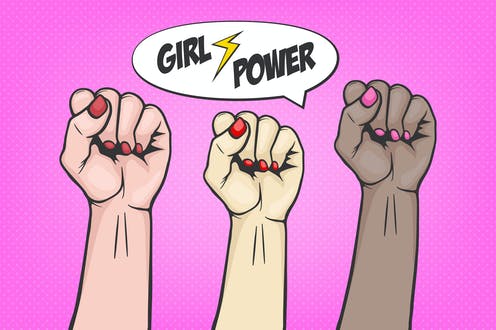The feminist movement refers to a series of political campaigns for reforms on issues such as reproductive rights, domestic violence, maternity leave, equal pay, women’s suffrage, sexual harassment, and sexual violence, all of which fall under the label of feminism and the feminist movement.
Feminism has much to do with the way women are seen and their status in society. It is a fight for the equality of the sexes, a fight for women to be able to be seen as the equals of their male counterparts.
The feminist movement is a broad term which covers many areas. Feminist movements have included politics, art, science, literature, etc. Feminism is seen as a movement, which as had various goals and achievements. The feminist movement has moved from the 19th century to now where in which feminist social movements have played a part in changing feminist goals and the structure of society.
The word feminism has been used to refer to “women’s movement”. This word was first used by Charles Fourier, a French philosopher in 1837 as he wrote about the structural basis of inequality. It was also used by the French author, George Sand in 1844 when she wrote “La Mere Fadette”. The term was used to define the concept of a woman’s right to work, and a woman’s right to choose to work and study when she is away from her family. In 1851 the term was used to refer to the movement for the right of women to vote in France. In this context it was also known as “feminism”. It was later used to refer to the movement for the extension of Suffrage to women and then after the first world war, the fight to obtain the right to vote for women in parliaments. In this context, “feminism” is used to define the idea of female independence and equal rights as well as the idea of using the state and social institutions to fight for these aims. After the first world war, the topic of feminism was usually referred to as suffragism.
What Is The Feminist Movement?
In the late 1800s and early 1900s groups of feminists organised meetings and demonstrations demanding women’s rights and an end to discrimination. Anti-suffrage women, known as the National Woman’s party used force to try to prevent women from voting. They broke up rallies and burnt voter registration cards. They also picketed the White House and attacked the home of the President Woodrow Wilson.
In 1931, there was an influential book Foundations of Feminism by a German feminist called Helene Stoecker. The book has been very important in the development of feminism. In this book, Stoecker emphasised the importance of constructing an “identity of femininity” that would remain unchanged because she believed that the definition of feminity was different in every group of women.
In the 1960s and 1970s the feminist movement accepted and blended into the civil rights movement. The National Organization for Women (NOW) encouraged women to develop their own voice independently of all other individuals, groups and organisations, including men. NOW also joined with other groups to create a Feminist Majority which was concerned with the equality of women.
In the later half of the 1960s, the feminist movement developed a different agenda. It allowed movements such as women’s liberation, dyke liberation, working class feminist movement, gynocriticism and lesbian feminism. The feminist movement also received impetus through the anti-war movement.
The women’s movement of the 1960s and 1970s influenced the gay movement. In 1993, the Stonewall riots were important in both the movement for gay rights and for the feminist movement. This was because women and gay men were important participants in the riots. Some were lesbians and some were lesbians and some were women.
A major goal in the feminist movement has been to encourage women to escape from roles that restrict and suppress their abilities. These roles include being a housewife, housekeeper and a nursei (Kenya). Though these roles are traditional, they hold women back from developing their independence and autonomy. In African society, there is a lot of emphasis on the rights of the family, as opposed to the rights of the woman. This means that the woman is often seen as an extension of the man. Ultimately, the aim of the feminist movement is to set the rights of women above others in society.
Feminism has shaped western society in a number of ways some of which include:
- The history of Women’s struggle from the suffrage movement to the present day
- What is feminism, with a look into how feminism became a household name
- Various types of feminism
- The history of the feminist movement
- The successes and failures of the feminist movement
The feminist movement has grown from its origins during the early part of the 1900s. There has been a change in how women’s social roles, especially within society, have transformed. This has not always been a smooth process as after the high of the suffrage movement a backlash occurred. During this backlash, women were expected to be the housewife because they were seen as weak. During the suffrage movement, women were seen to be able to do anything that a man could.
Women also had a part to play in the history of the feminist movement. For example women such as Mme de Stael, Baroness Dudhi and Philosopher Mary Wollstonecrafts were part of the early stages of the feminist movement. Women were at the forefront of the movement for the vote throughout the twentieth century. During the 1980s, ideological feminism became more popular and women became more involved with the feminist movement.
Some women have not had an easy relationship with the feminist movement. This is because their views and actions are often different to the accepted ideas and actions that happen in a world that is becoming increasingly sensitive to the feminist movement. This has lead to a backlash against feminism where people feel that women and men are equal.









